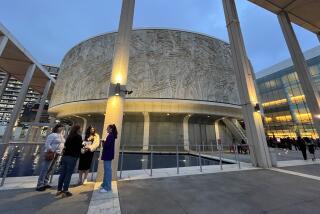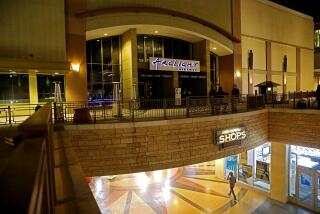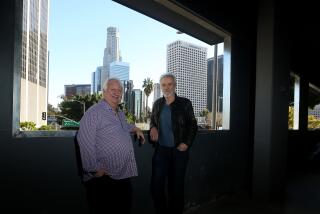Starlight Setback : Promoter’s Contract With Burbank Dies
Burbank officials and concert promoter Tom Griffin agreed Friday to terminate their contract authorizing Griffin to operate the troubled Starlight Amphitheatre in Burbank, ending a relationship marred by financial woes and unrealized hopes.
The termination means the open-air amphitheater, which is owned by the city, will likely remain dark all summer except for one or two community events. Even after a new operator is signed, commercial acts probably will not be booked for the Starlight until next summer, according to Rich Inga, director of the city’s Parks and Recreation Department.
Inga said Griffin had been unable to secure any investors to finance activities at the Starlight. Griffin’s production company has accumulated almost $180,000 in debts since the city awarded him a contract to operate the Starlight early last year. He had been searching for new investors since filing for protection under Chapter 11 of the U.S. Bankruptcy Code in early April.
Renewed in November
Even though the city had renewed Griffin’s one-year contract last November after an unprofitable season, Inga and Griffin had agreed that the contract would be terminated by mutual agreement if Griffin could not find sufficient financing for the Starlight productions by May 31.
“Tom Griffin told me he did not have the financing needed to proceed with his operation, and he did not request a time extension,” Inga said. “He expressed a desire to meet with me during the first part of next week to wrap things up.”
Griffin, 27, could not be reached for comment Friday.
Inga said he would soon start “entertaining proposals from qualified operators,” adding that he hoped to conclude negotiations with a new operator by next January.
Although Griffin last summer managed to stage the first commercial events in five years at the venue, including a successful rhythm and blues concert, Inga said that the city is “back to square one” in its effort to establish the Starlight as an entertainment facility comparable to the Universal Amphitheatre and the Greek Theatre.
‘Good Effort’ Praised
“We would not have renewed Tom’s contract had we not felt that he had made a good effort as far as marketing concerts and staging some successful concerts,” Inga said. “He had his heart and energies in the right place, but unfortunately he was not able to carry through.”
Despite past difficulties, Inga said, “I think it can be a successful venue without a change in strategy. But it will be a building process of about three to four years.”
Griffin has blamed his financial troubles on what he has described as the failure of entertainment promoter Edward McDonald to live up to his promises to back Griffin financially. Griffin has said McDonald promised in writing to invest $500,000 to $1 million in the operation. McDonald has refused to comment in the past on Griffin’s allegations.
$10,000 Owed to City
Griffin’s debts include more than $10,000 owed to the city of Burbank for rental of the Starlight and for police and fire costs. Griffin had said earlier that his production company probably would have to be liquidated if he were unable to find additional investors and that he would be personally responsible for at least part of the Starlight debt, which he had guaranteed to pay back. Payment of the debt will be resolved in bankruptcy proceedings.
Griffin previously had been mostly involved with staging cabaret revues and productions for dinner theaters, convention groups and local small theaters. His operation of the Starlight was his first venture into
promoting major commercial concerts.
The Starlight, which can accommodate 6,500 spectators, has a history of misfortune and difficulties. The theater was the center of controversy during the late 1970s when the city forbade a promoter from staging rock concerts. The U.S. Supreme Court ruled last month that the city had acted unconstitutionally in banning the rock acts.
In addition, a citizens’ advisory group overseeing the operation of the Starlight in 1983 instructed another promoter, the Eric/Chandler concert firm, not to book rock and pop music acts that it considered “undesirable.” Although city officials subsequently gave the promoter complete freedom in booking acts, officials of the promotion firm said they were unable to attract any performers to the Starlight because of bad publicity resulting from the proposed ban.
More to Read
The biggest entertainment stories
Get our big stories about Hollywood, film, television, music, arts, culture and more right in your inbox as soon as they publish.
You may occasionally receive promotional content from the Los Angeles Times.











